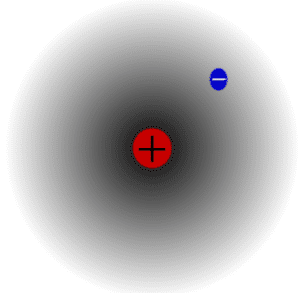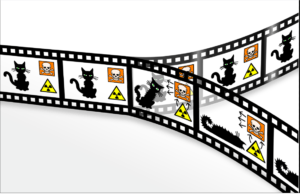What is one possible response when we learn in quantum mechanics that a particle can be in more than one place at the same time? Or that particles which are across the galaxy from each other can coordinate their behavior instantaneously? The thought might pop up that possibly quantum mechanics is wrong. The question as to whether quantum mechanics might be wrong can more easily be addressed by breaking it in two:
Question 1: Are the equations of quantum mechanics wrong?
The answer to this is a qualified, No. The equations of quantum mechanics work with extremely high accuracy to predict the results of experiments with atomic and subatomic particles.

[Image source: Mets501 (Own work); https://en.wikipedia.org/wiki/Proton; CC-BY-SA-3; retrieved Feb. 16, 2018.]
A scientific theory is wrong if its predictions are wrong regarding the behavior of the physical universe. Physicists have been using the principles of quantum mechanics to successfully predict the results of experiments since 1900.

“…[T]he many predictions by which quantum theory has been tested stand up, with an accuracy so stupendous that Feynman [a physics Nobel Laureate] compared it to measuring the distance between New York and Los Angeles accurately to the width of one human hair. On the basis of these stunningly successful predictions, quantum theory, or some version of it, seems to be as true as anything we know.”*
In contrast, Newton’s laws of classical mechanics do not accurately predict the results of quantum physics experiments.
The equations of quantum mechanics have also served to create all of today’s electronics—computers, lasers, cell phones, MRI’s, etc. These equations allow scientists to control subatomic particles like electrons (as in computers) and to control light (as in lasers).
Question 2: Are the interpretations of quantum mechanics equations wrong?
So, does this mean that it’s true that a particle can be in more than one place at the same time? No, not necessarily. Being in more than one place at the same time is an interpretation of what the mathematical equations of quantum mechanics are telling us about the nature of reality. Specifically, it’s the Copenhagen Interpretation of quantum mechanics, the original interpretation** developed in the 1920’s and ‘30’s.
The Copenhagen is the interpretation usually taught in universities. Often, it’s taught as if it’s one and the same as “quantum mechanics.” Students can get the incorrect idea that there is only one possible meaning of the equations for the nature of reality. While it leads people to say that a particle can be in more than one place at the same time, this is actually a mischaracterization. Copenhagen really says that prior to detecting a particle, we can’t possibly know where it is nor should a scientist ask. Both the mischaracterization and the real statement seem unsatisfactory to me.
Other Interpretations of Quantum Mechanics
There are over 20 interpretations of quantum mechanics: Copenhagen, Many Worlds, Bohmian, Transactional, etc. Many of them conflict.

The Many Worlds Interpretation, as an extreme example, provides a completely different interpretation of the equations of quantum mechanics. The Many Worlds Interpretation assumes that there are infinite numbers of universes. In each universe, particles always have only one position at any moment in time. In the universe in which we happen to reside, we can find its position. So can the residents of all the other universes.
The de Broglie-Bohmian Interpretation also assumes that particles only ever have one position, but doesn’t go to the extreme of assuming an infinite number of universes. It imagines a wave of a new type of energy carrying the particle along like a surfer.

The Transactional Interpretation*** holds that particles exist in a wavy sublevel of reality prior to detection. This wavy reality follows quantum laws. In accordance with these laws, probabilities interact with each other to determine what shows up in physical reality. Only upon detection, does a real particle enter physical reality.
A good analogy for the Transactional Interpretation is an iceberg. In our physical reality, we see the tip of the iceberg. But there’s a lot going on beneath the surface.
Might there be a better theory than quantum mechanics?
Here is the qualification to my answer that “No, it’s not possible that quantum mechanics is wrong.” The history of science tells us that it’s likely that the equations of quantum mechanics will someday be replaced. Quantum mechanics may be found to have been a good approximation; but there may be something closer to the truth.
This happened with Newton’s law of gravity. For almost 300 years, physicists believed that Newton’s equation for the strength of gravity is a fundamental truth of the universe. Turns out, it’s only a very good approximation. The inaccuracy becomes noticeable when objects with large masses are close together. Thus, it can’t be used to accurately calculate the orbit of Mercury around the Sun. Both are objects with large masses, and Mercury is the closest planet to the Sun. In contrast, Einstein’s General Relativity is able to calculate Mercury’s orbit. It’s a more accurate theory and, among scientists, has replaced the Newtonian equation for gravity.
But Newton’s equation is sufficiently accurate to have been used to design the moon landings of the 20th Century. And it continues to be used in the engineering of bridges and roads. It’s a lot easier to work with than the equations of General Relativity. And Newton’s equation is close enough for these types of engineering projects.
There are already reasons to believe that quantum mechanics will one day be superseded by another set of equations. When physicists try to combine the equations of quantum mechanics with the equations of General Relativity, they can get nonsense answers. That is, sometimes the equations result in the answer, “infinity.” Infinity is not a number, so it’s useless to physicists. When infinity comes up as an answer to an equation, it means that something is wrong. For example, someone has divided by zero or committed some other mathematical sin.
If physicists develop an even more accurate theory that combines well with General Relativity, they will, undoubtedly, stand on the shoulders of quantum mechanics. And in the meantime, look at all the electronic toys that quantum mechanics has given us!
Is quantum mechanics a useful theory?
OK, so maybe one day we’ll find that quantum mechanics is not completely accurate. But I started by suggesting that there’s a question even more important than the accuracy of quantum mechanics: Is quantum mechanics useful? Of course, it’s been extremely useful for developing electronic gadgets. But has it been useful in forwarding scientific understanding?****
Newton’s law of gravity turned out to be inaccurate, but it has been useful for hundreds of years and is still useful today. It has been useful not only for launching rockets to the moon, but also it’s been useful in the advancement of science.
Newton’s equation for gravity has facilitated the development of many branches of science: astronomy, materials science, geology, etc. It has been an extremely productive equation that has allowed many kinds of scientists to make leaps and bounds of progress. So, while not completely accurate, it has been extremely productive.
But it’s not just Newton’s equation that was productive, it was also his interpretation (mass attracts mass) that has been productive. Einstein showed with General Relativity that this interpretation is incorrect. Nevertheless, Newton’s interpretation was productive of great work, including in astronomy.
Astronomers who assumed that mass attracts mass were able to create new theories about what might be happening in the heavens. When observations showed that Uranus was not following the orbit that Newton’s law ordained, astronomers thought, “Mass attracts mass—maybe another mass is attracting Uranus and pulling it off its expected orbit.” In the middle of the 1800’s, they looked for that mass with their telescopes and found Neptune.
This pattern has been repeated over and again in science. Someone observes something and describes their observations with an equation. They explain why the equation works with an interpretation as to the nature of reality, for example, mass attracts mass. And that gets them thinking about what they might observe if they were to make a new observation or do a new experiment. The experiment/observation tells them new things. The equation is refined or even replaced, and scientific knowledge grows to cover more phenomena with greater accuracy.*****
So, is it possible that quantum mechanics is wrong?
This time I’ll answer with a qualified, Yes. But, hey, that’s just the way it goes in science!
Footnotes
*Richard Dawkins, Intuition and Common Sense, Philosophy of Science.
**Often, physicists call the equations the “theory.” If speaking more precisely, they call the equations the “formalism” of the theory, and the implications of the equations for the nature of reality are the interpretation of the theory.
***For a layperson’s book on the Transactional Interpretation, see Ruth E. Kastner, Understanding Our Unseen Reality, Solving Quantum Riddles, 2015.
****Physicist, David Deutsch, writes about the value of a scientific theory being its fruitfulness in spurring further research in the book, The Beginning of Infinity.
*****Thomas Kuhn in the book, The Structure of Scientific Revolutions, famously describes this cycle as scientific “paradigm change.”
